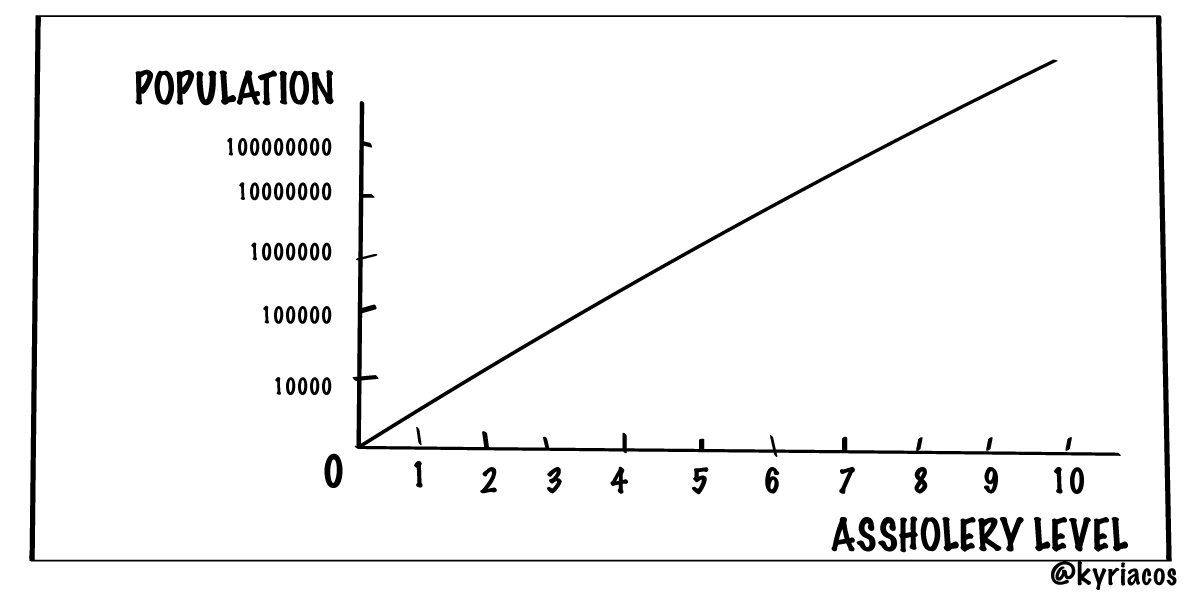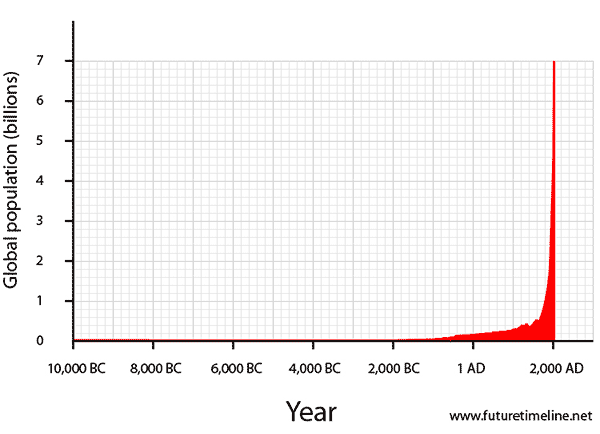Population Growth Is Directly Proportional to Assholery
There is a clip that shows a small child being run over by a car. The event takes place in China. Passengers pass by and nobody even attempts to help. I am not going to post the video. Do the google search yourself. There are plenty of such examples in densely populated areas.
I grew up in a small village where everyone knew everyone else. Whenever someone needed help, somebody was there to offer assistance. Whenever someone fucked up, the individual ended up being stigmatized from the entire community. When I moved abroad, eventually ending up in New York, I witnessed the exact opposite. People in need where exponentially more but people rarely attempted to help. Good Samaritans were so rare that some good acts were going viral on youtube. Most people apparently were in awe since witnessing a heroic behavior was rather a rare phenomenon that they had to share. I am sure you have stumbled upon these videos as well.

Behavioral ethologist John B. Calhoun coined the term "behavioral sink" to describe the correlation between population density and societal collapse. Various experiments were performed such as in populations of cats and rats and similar patterns were observed. As density of populations increases, violence and mortality also increases leading eventually to a total population collapse. You can watch the rat experiment below.
"...But... We Are Not Rats"
Steven Pinker argues that violence has decreased. I beg to differ since he bases his argument on gross generalizations and a rather poor definition of violence. Many people seem to site his books as evidence but on careful examination all his claims almost can be debunked. For example he takes into account mostly major wars that are outliers of human behavior and he counts only deaths. If one takes a closer look into the facts they would realize that major wars have decreased but mini-conflicts have become a daily basis. For example USA has been having open war fronts for the last 50 years now. Countries have also realized that war can be fought much smarter such as by economically isolating a country. It becomes harder and harder to actually count bodies this way. Moreover, there is absolutely no evidence that early human societies were violent. In fact, the opposite has been demonstrated to be true.
Small societies tend to agree upon a common code of behavior. This is also observable in families and friends. The reason there is more trust is because people engage with each other more thus developing more intimate and trusting relationships. As population grows, competition and alienation also increases. Various events can happen and action-causative events between members is hard to distinguish. As a result, people become more vigilant and devious in an attempt to protect themselves. Moreover, disease spreads much faster and infections that could be otherwise be controlled mutate on a different level, having a devastating effect.
The economic model upon which humanity operates right now is location and resource depended — hence why we observe so many people in major cities. The U.N estimates that 54% of the world’s population lives in urban areas, a proportion that is expected to increase to 66% by 2050. Currently, we are on the fringe of creating superbugs, aka bacteria that are resistant for modern antibiotics. If we continue with this rate without changing the way we live, then we might see a massive correction in our population "bubble".
Let's hope Nature is not an expert trader...



I think that the fundamental problem with human societies lies in the scale factor. As Harari points out in his book 'Sapiens', the human interactions and social events are vastly shaped by each society's numbers. A small scale community is most likely to shape strong and long lasting relationships between its members as part of a mutual win-win cooperation. Even in the case of an dissapointed/distant individual the need for survival would eventually force him into either joining the team or abandoning it. And since the possibilities for survival alone in the pre-historic times where quite low comparing to today's standards the individual would propably choose to work with the team. As that number grows and people are starting to stack up into mass urban complexes, the propability of a respectable amount of different community-leavers joining forces into a new group rises significaly. A good example of that would all the different types of music/entertainment/sports tat exist in every society. The choices people make shape their identities, or atleast the way they define themselfes. So imo I think that a big part of the issue lies on the social nature of humans, the ' I dont like them, so Im gonna do it my way', which leads to inevitable conflicts and therefore the feeling of someone beeing an ashole to the people around him.
I hope that makes sense !
Χαιρετίσματα από την πατρίδα ;)
It does.
Very well put and excellent book for reference.
Καλά να'σαι
exectly
I'm struck by the similarity between the "beautiful ones" in the video and today's celebrity chasing youth.
What's really scary is that the study this film documents appears to have taken place back in the 1980's.
But these urban areas are entirely dependent on the rural areas for food.
The Confined Feedlot Operations urban areas depend on for food are also breeding grounds for the superbugs you mention. My understanding is that the preventive use of antibiotics & growth hormones in these operations are a major contributor.
I like living in the country. The occasional trip into a city helps remind me why.
actually they don't HAVE to be dependent on rural areas for food.
vertical farming, aquaponics, hydroponics, to name just a few alternatives to farms.
But they have to be willing and able to learn how.
That's always the tricky part.
nope...that's the best part.
it's automagic.
The biological solution. Whoever doesn't do it, doesn't do ANYTHING.
I was thinking along those lines too! I've seen animals being raised in overcrowded conditions. The manure piles up, the flies come in, the animals get sick, they begin to fight for space, clean water, and food. Soon after, they start dying, one by one. All it would take is for New York not to be able to flush their toilets for ONE day....
And Atlantic City would starve?
Sorry, I couldn't resist that one. ;-)
Oh dang! LOL!
Yes, the Malthusian growth model. We will inevitably run out of resources and pollute our environment to mass extinction. Like any bacterial culture on a Petri dish. Or maybe there is hope:)?
there IS hope.
a higher standard of living.
Nations with high standards of living are experiencing population decline.
Japan for example...
It's self-regulation. If you want higher standard you don't want kids or even wife. It's coming into the western civilization. But we represent only maybe a quarter of the whole population or even less. Ans story goes on and on.
I think dense population is just another hurdle we humans have to get over. Just like eventually we have to be able to travel into space. It's just eveloution.
Right now it is the easiest it's ever been to be alive on this planet. So in many ways there have been positive impacts from civility and knowledge allowing a growing population to flourish.
We as the human race consume. That's what all life does. It's a natural cycle. We have to be more and more aware of our footprint on the environment and everything else surrounding us. So our mindset should always be, how can we learn from mistakes, how can we improve our lives, how can we preserve our planet, and continue to push one another in a positive manne. Instead of constantly berating ourselves as parasites.
Evolution has a funny way of correcting things on its own, but if we give it some time, thought, and effort, we may be able to make the world a better place for everything on it.
Brilliant and-- of course-- somewhat alarming post. As I read this, I couldn't help but repeatedly think about the movie "Idiocracy." And, as I watch the world around me, I keep feeling like we're just all getting dumber every year.
I often see people citing the idea that violence is decreasing... but that's a pretty myopic view, in my opinion. Maybe physical violence is down, but with the advent of the Internet, the incidence of emotional violence is much higher... people being bullied and trolled, sometimes to the point where they commit Suicide. How can that NOT be seen as "violence?"
I live in a smaller town/city... about 10,000. One of the things I like about being here is that there's still a sense of community here.
Violence is the use of physical force, usually to cause harm.
I believe the term you're looking for is "Abuse", which is just as egregious in my mind. Whether you damage someones body or mind is irrelevant, the perpetrator is still being an asshole.
Yeap, many people cite the research from Pinker who rather brings the whole thing under a an over-generic narrative. Violence has not decreased. It merely changed the way that is being expressed.
I feel half of the world's population is already part of "Idiocracy". We hardly know how to grow our own food, let alone prepare it so that we can actually eat it.
Maybe we, the Steemians of the hour, can make a small difference for that matter.
The worlds going to hell in a hand basket. I just saw a video in Spain where they set the bulls horns on fire... the bull then realizing his situation ran full speed onto a pole to kill itself and did.. I fucking hate humanity and have no hope for it at all... Ive been asking the lord to calm me down all day after watching it. My blood is still boling hours later. Give me five minutes alone with any those people there watching. Ill set their faces on fire
Easy man. It's not so bad. Enjoy your life. It's too short for bull shit.
Share the same observations and worries as you do. It is a question I find myself asking an age where globalization is continuing at a rapid pace, and where the mobility of people increase (so not only are we living in communities with more people, we also see new people move in and out of the community much quicker and thus have less reason to expect that those we interact with will be there to repay the favour, or that their increased education or well-being will benefit the community you live in long-term):
Whether we on the basis of these observations would be better of returning to a more community-based living, or if taking on this challenge in order to overcome it is what will allow us to take new great steps as a civilization.
I for one am hoping it drives Humanity to take that next big step, because I don't know if anyone else has noticed this...
But our society/civilization is modeled after the Romans and Greeks, and to some degree, Sumeria. Are we really so unimaginative that the best we can do is model the systems we found in the dustbin of history? I'm pretty sure we are long past the "Use By" date for this system.
We have the internet. We have the technology. We have to improve our civilization, because this Bronze age system is getting ready to fold up.
Indeed a very good point you made in this post...modern society is a place full of 'Assholery'....I still remember how my grandfather used to talk about unity and bond people used to have during their times...it's very common these days to see people ignoring even if someone is in dire need of help...I think we should have an 'Assholery award' to embarrass people who are caught escaping from their social and human responsibilities.
I completely agree with the population/assholery graph. Grew up in LA and spent my time in a lot of smaller cities. But it occasionally happens Larger cities tend to have microcities embedded, where people in small communities tend to help out each others.
If humans begin to consume a more loving, raw fruit/plant based diet, that assholery will begin trending down :)